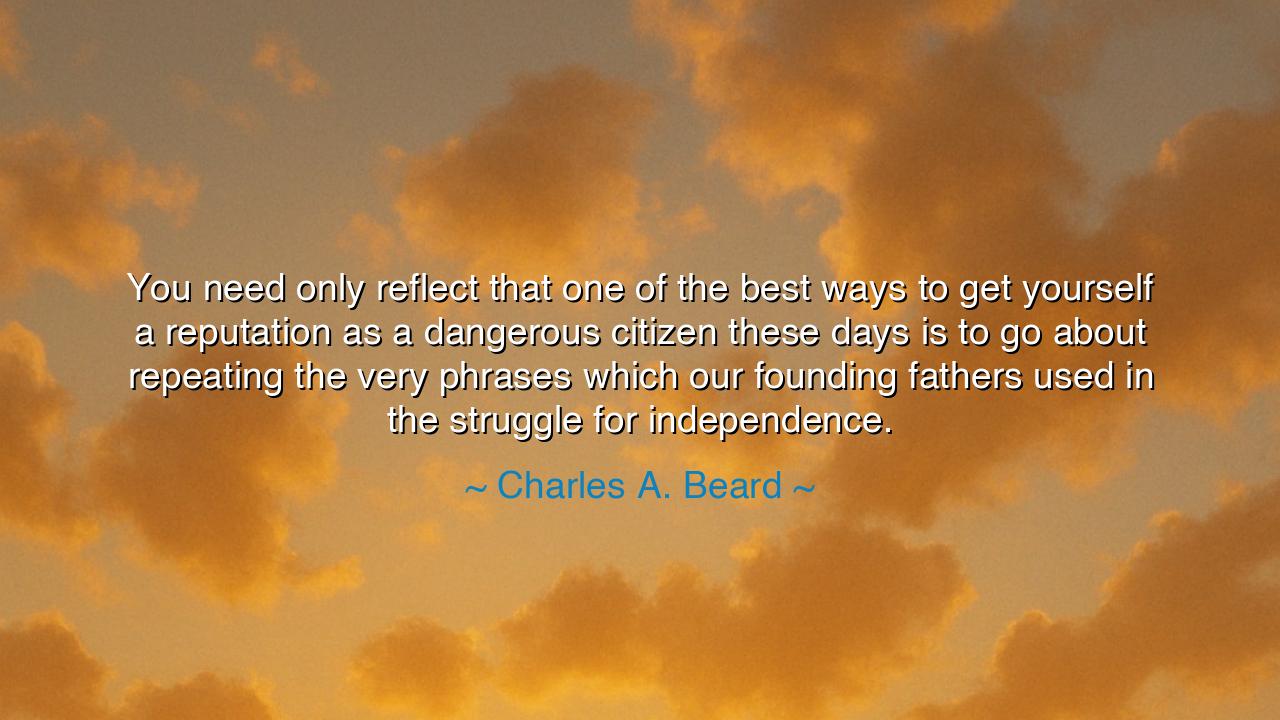
You need only reflect that one of the best ways to get yourself a
You need only reflect that one of the best ways to get yourself a reputation as a dangerous citizen these days is to go about repeating the very phrases which our founding fathers used in the struggle for independence.






The words of Charles A. Beard, a historian of piercing intellect and fearless candor, carry the weight of both irony and truth. When he declared, “You need only reflect that one of the best ways to get yourself a reputation as a dangerous citizen these days is to go about repeating the very phrases which our founding fathers used in the struggle for independence,” he was not merely making a clever observation—he was sounding a warning to the conscience of free men. His statement speaks to the decay of memory, to the tragedy of a nation that forgets its own origins, and to the peril that arises when the language of liberty becomes subversive in the very land it once gave birth to.
To understand the origin of this quote, we must recall the man who spoke it. Charles Austin Beard, one of the great American historians of the early twentieth century, was known for his bold interpretations of history, particularly his belief that economic interests and class struggles shape the course of nations. He lived in an era of rising nationalism, corporate power, and war fever—times when dissent was often painted as treachery. Having witnessed both the triumphs and failures of American democracy, Beard grew disillusioned with how far the nation had drifted from its founding ideals. He saw citizens who mouthed patriotic slogans yet feared true freedom of thought, and leaders who cloaked greed and control in the garments of patriotism. His quote arose from that dissonance—from his recognition that to speak the old truths of liberty in a conformist age is to invite suspicion, even hostility.
The irony in Beard’s words is sharp and enduring. The founding fathers—Jefferson, Adams, Franklin, and their compatriots—were rebels and revolutionaries in their time. Their cries for freedom, self-governance, and resistance to tyranny were once considered dangerous by the powerful British Crown. Yet those same cries became the foundation of the American Republic, carved into the Declaration of Independence and the Constitution. Beard lamented that, centuries later, those same revolutionary principles had grown so domesticated, so hollowed by routine and comfort, that to speak them sincerely again—to challenge corruption, inequality, or imperial ambition—was to be branded an agitator, a dangerous citizen. Thus, he revealed a painful truth: the greatest betrayal of freedom comes not from its enemies, but from the complacency of those who claim to love it.
Consider, for instance, the story of Eugene V. Debs, an American labor leader of the early 1900s. Debs, inspired by the principles of democracy and equality that echoed those of the founders, spoke passionately against economic exploitation and the injustices of war. For this, he was imprisoned under the Espionage Act of 1917, condemned as a traitor to the very nation whose liberties he sought to defend. His words—calling for freedom of conscience, the dignity of labor, and the right of dissent—were not unlike those that once thundered from the lips of Patrick Henry and Thomas Paine. Yet in a time when power demanded obedience, the language of liberty itself became dangerous. Beard’s quote captures precisely this paradox: that in moments of fear and conformity, to remind a nation of its founding truth is to stand accused of rebellion.
In the voice of the ancients, we might say: when a people forget the fire that forged their freedom, they grow afraid of its heat. The phrases of independence, once holy, become heresy; the heroes of yesterday would be the radicals of today. Beard’s lament is not only about America—it is a timeless reflection on all societies that have grown comfortable in their prosperity. For comfort breeds amnesia, and amnesia breeds servitude. A nation that worships its founders yet silences those who speak their ideals has entombed liberty in marble rather than lived it in spirit.
There is a quiet heroism in being such a “dangerous citizen.” It is the heroism of the thinker who refuses to bow to dogma, of the patriot who loves truth more than applause, of the soul that would rather be honest in exile than silent in luxury. These are the citizens who keep democracy alive when institutions rot and leaders grow arrogant. In every age, such men and women have existed: Socrates in Athens, Galileo in Italy, Martin Luther King Jr. in America—all condemned for daring to remind their societies of truths they had forgotten. To be a “dangerous citizen,” in Beard’s sense, is to be one who loves their nation enough to challenge it.
The lesson of Beard’s words is clear: freedom must be renewed through courage, not comfort. True patriotism is not blind loyalty, but moral vigilance. The test of a people’s virtue lies in how they treat those who speak uncomfortable truths. A nation secure in its freedom welcomes dissent, while one that fears it is already enslaved by its own insecurity.
And so, the practical path is this: dare to remember. Dare to speak. Read again the words of the Declaration of Independence, the Bill of Rights, and the old cries for justice that once set the world aflame—and do not merely recite them, but live them. Let no age or authority convince you that truth is rebellion or that conscience is crime. For as Charles A. Beard teaches, the moment a free people grow afraid of their own founding ideals, they cease to be free at all. To be a “dangerous citizen,” then, is not to threaten one’s nation, but to preserve it—by keeping alive the eternal flame of independence, justice, and courage that once lit its birth and must forever guard its soul.






AAdministratorAdministrator
Welcome, honored guests. Please leave a comment, we will respond soon